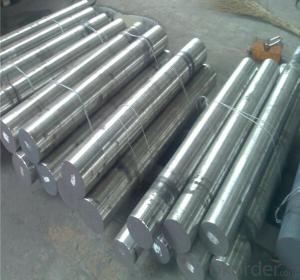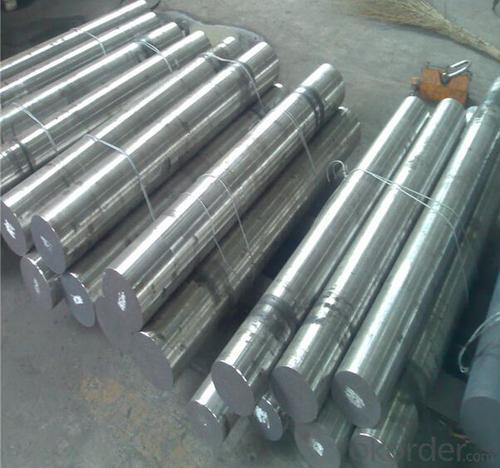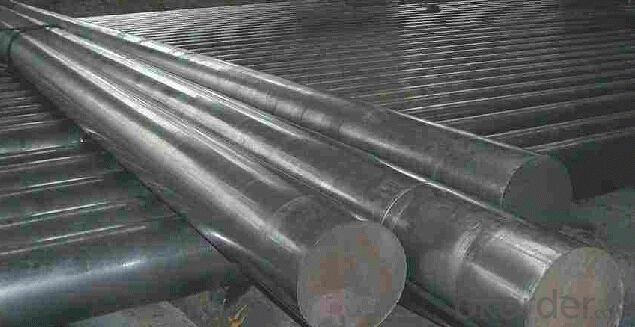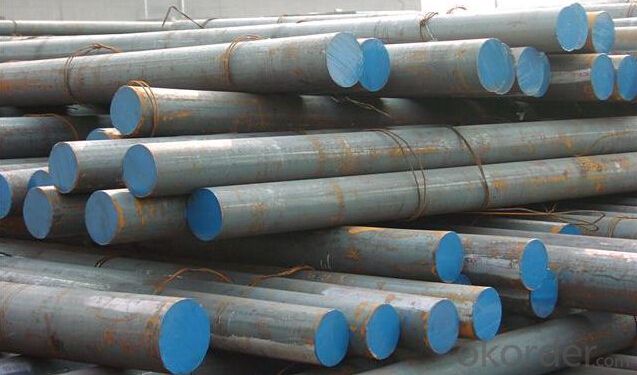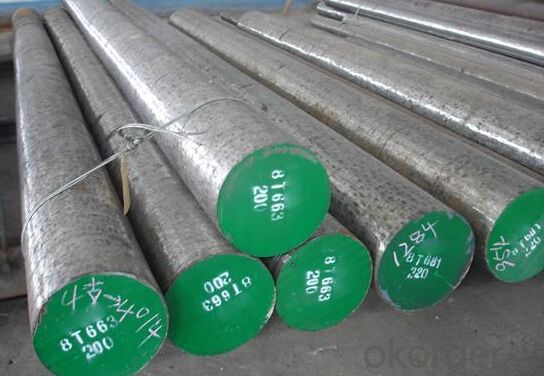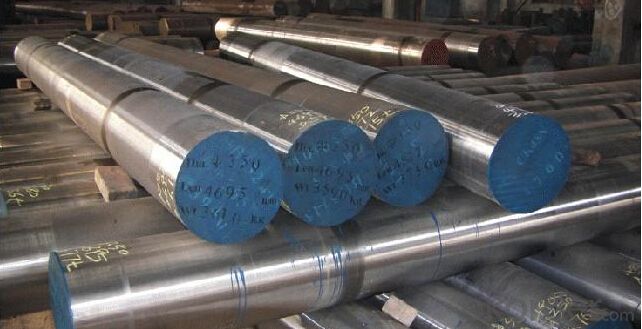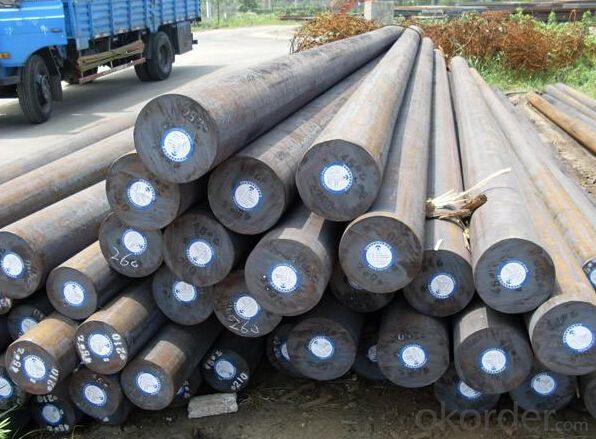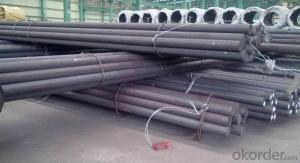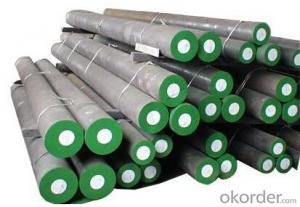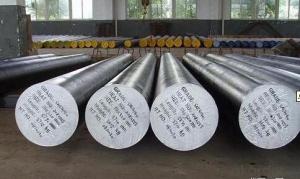Grade AISI 5120 CNBM Alloy Steel Round Bar Made in China
- Loading Port:
- Shanghai
- Payment Terms:
- TT OR LC
- Min Order Qty:
- 3 m.t.
- Supply Capability:
- 10000 m.t./month
OKorder Service Pledge
OKorder Financial Service
You Might Also Like
Specification
Product Description
1. Diameter: 8mm-250mm rou
2. Length: 2m, 3m, 5.8m, 6m or customized
3. Standard: GB, ASTM, AISI, SAE, DIN, JIS, EN
4. Produce Process: smelt iron - EAF smelt billet - ESR smelt billet -hot rolled or forged -steel round bar and plate
5. Heat Treatment: annealing, normalizing, tempering, quenching
6. Surface Treatment: Black, Polished, Galvanized
7. Quality Assurance: We accept third party inspection for all orders.
You can ask testing organizations such as SGS, BV, etc. to test our products before shipping.
Chemical Composition
Grade | Dia.(mm) | C | Si | Mn | Cr | P | S | Ni | Cu |
5120 | 16-85 | 0.18-0.24 | 0.17-0.37 | 0.50-0.80 | 0.70-1.00 | ≤0.035 | ≤0.035 | ≤0.03 | ≤0.03 |
5140 | 16-400 | 0.37-0.44 | 0.17-0.37 | 0.50-0.80 | 0.80-1.10 | ≤0.035 | ≤0.035 | ≤0.30 | ≤0.03 |
4135 | 13-230 | 0.32-0.40 | 0.17-0.37 | 0.40-0.70 | 0.80-1.10 | ≤0.035 | ≤0.035 | ≤0.03 | ≤0.03 |
4140 | 13-360 | 0.38-0.45 | 0.17-0.37 | 0.50-0.80 | 0.90-1.20 | ≤0.035 | ≤0.035 | ≤0.03 | ≤0.03 |
Application:
Mechanism & Fasteners gear, Stressed components for vehicles
Engines and machines, Parts of larger cross-section
Company Information:
CNBM International Corporation is the most important trading platform of CNBM group.
Whith its advantages, CNBM International are mainly concentrate on Cement, Glass, Iron and Steel, Ceramics industries and devotes herself for supplying high qulity series of refractories as well as technical consultancies and logistics solutions.
Packing & Delivery
1. Packaging: seaworthy package or as required
2. Delivery: 35-45 days or based on quantity
Products Show
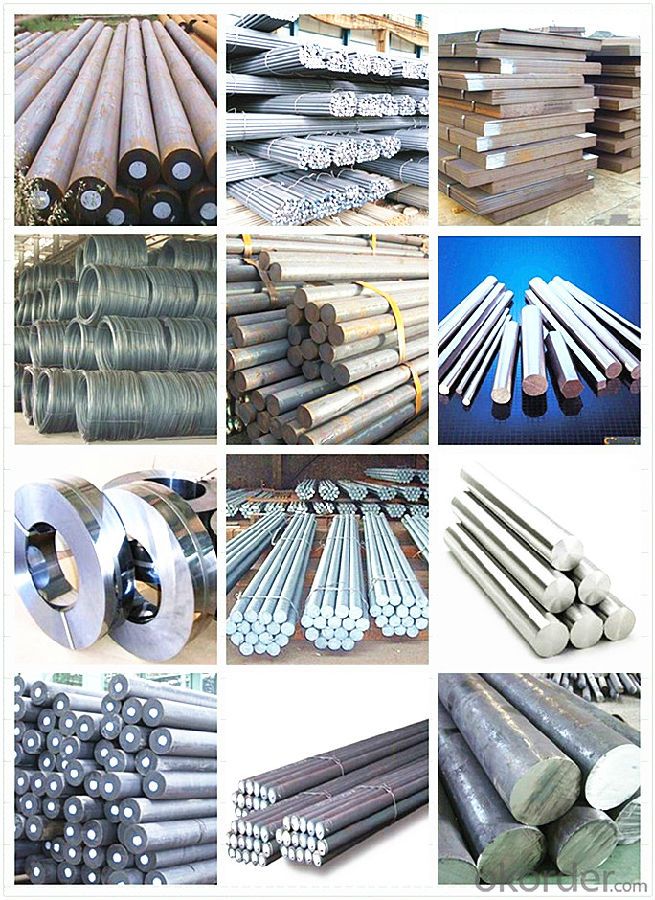
FAQ:
1.Your advantages?
Professional products inquiry, products knowledge train (for agents), smooth goods delivery, excellent
customer solution proposale
2. Test & Certificate?
SGS test is available, customer inspection before shipping is welcome, third party inspection is no problem
3. Factory or Trading Company?
CNBM is a trading company but we have so many protocol factories and CNBM works as a trading department
of these factories. Also CNBM is the holding company of many factories.
4. Payment Terms?
30% TT as deposit and 70% before delivery.
Irrevocable L/C at sight.
5. Trading Terms?
EXW, FOB, CIF, FFR, CNF
6. After-sale Service?
CNBM provides the services and support you need for every step of our cooperation. We're the business
partner you can trust.
For any problem, please kindly contact us at any your convenient time.
We'll reply you in our first priority within 24 hours.
- Q: How is special steel tested for quality and durability?
- Special steel undergoes a series of rigorous processes and tests to assess its quality and durability. These tests are carefully designed to guarantee that the steel meets the necessary standards and can withstand different conditions and applications. One widely used method for testing special steel is the tensile strength test. This test measures the maximum level of stress that the steel can endure before breaking or deforming. To conduct this test, a sample of the steel is subjected to a pulling force until it reaches its breaking point. The outcomes of this test determine the steel's ability to resist external forces and its overall strength. Another crucial test is the hardness test, which determines the steel's durability. This test involves assessing the steel's resistance to indentation or scratching. A sample of the steel is pressed against a hard surface, and the depth of the indentation is measured. The steel's hardness indicates its resistance to wear and deformation. Apart from mechanical tests, special steel is also subjected to various chemical and metallurgical tests. These tests help determine the steel's chemical composition and microstructure, which are vital factors in ensuring its quality and durability. Spectroscopic analysis is used to identify the steel's exact chemical composition, while metallography is employed to examine the steel's microstructure and identify any impurities or defects. Furthermore, non-destructive testing methods are used to evaluate the steel's internal structure without causing any damage. These methods include ultrasonic testing, magnetic particle inspection, and radiographic testing. Ultrasonic testing employs high-frequency sound waves to detect internal flaws or defects in the steel. Magnetic particle inspection uses magnetic fields to identify surface cracks or discontinuities. Radiographic testing, on the other hand, uses X-rays or gamma rays to examine the internal structure and identify any defects that may compromise the steel's quality and durability. Overall, the testing process for special steel encompasses mechanical, chemical, metallurgical, and non-destructive testing methods. Through these tests, manufacturers can ensure that the steel meets the necessary standards and can perform reliably in various applications, ensuring its quality and durability.
- Q: What are the different methods of surface peening for special steel?
- To enhance the mechanical properties of special steels, surface peening is employed to induce compressive stresses on the surface. This process helps improve fatigue life, resistance to stress corrosion cracking, and overall durability. Various methods of surface peening exist for special steel, including: 1. Shot Peening: This technique involves bombarding the steel surface with high-velocity spherical particles, known as shot. The impact of these particles induces plastic deformation and creates compressive stresses. Shot peening is widely used due to its effectiveness in improving fatigue life. 2. Ultrasonic Peening: Compressive stresses are induced on the steel surface using high-frequency vibrations in ultrasonic peening. These vibrations are applied through a tool in contact with the surface, leading to plastic deformation and the generation of compressive stresses. 3. Laser Peening: A high-energy laser beam is utilized in laser peening to create shockwaves on the steel surface. These shockwaves induce plastic deformation and generate compressive stresses. Laser peening is known for its precision and ability to target specific areas. 4. Cavitation Peening: By creating cavitation bubbles near the steel surface in a liquid medium, cavitation peening induces compressive stresses. The collapse of these bubbles generates high-intensity shockwaves. This method is particularly beneficial for irregularly shaped components. 5. Needle Peening: In needle peening, a bundle of fine needles is repeatedly impacted on the steel surface. This process induces plastic deformation and generates compressive stresses. Needle peening is commonly used for localized treatment of small areas. Each of these methods offers unique advantages and is suitable for specific applications. The selection of the surface peening method depends on factors like the type of special steel, component geometry, desired improvements, and available equipment. It is crucial to consider the specific requirements and seek expert advice to determine the most appropriate method for surface peening special steel.
- Q: How does special steel resist deformation under load?
- Special steel resists deformation under load due to its unique properties and composition. It is typically made with higher levels of alloying elements such as chromium, nickel, and molybdenum, which enhance its strength, hardness, and toughness. These alloying elements form strong bonds within the steel's crystal lattice structure, making it more resistant to deformation. Additionally, special steels often undergo heat treatment processes such as quenching and tempering, which further refine their microstructure and increase their ability to withstand loads without deforming. Overall, the combination of alloying elements and heat treatment techniques allows special steel to maintain its shape and structural integrity even under high-stress conditions.
- Q: How is precipitation-hardening steel used in aerospace applications?
- Precipitation-hardening steel is commonly used in aerospace applications due to its exceptional strength-to-weight ratio and excellent corrosion resistance. It is extensively used in critical components such as aircraft structural parts, landing gear, engine components, and fasteners. The precipitation hardening process involves heating and cooling the steel to create a fine dispersion of precipitates, which significantly enhances its mechanical properties. This steel's high strength allows for the construction of lighter and more fuel-efficient aircraft, while its corrosion resistance prolongs the lifespan of aerospace components, ensuring safe and reliable operation.
- Q: What are the main applications of special steel in the automotive electrical systems?
- Special steel is widely used in automotive electrical systems for various applications. One of the main uses is in the production of electrical connectors and terminals, where special steel offers excellent conductivity and corrosion resistance. Additionally, special steel is utilized in the manufacturing of electrical contacts, relays, and switches, ensuring reliable and efficient performance in the automotive electrical systems.
- Q: What are the properties of wear-resistant stainless steel?
- Wear-resistant stainless steel possesses several key properties that make it a highly durable and reliable material. Firstly, it has a high hardness level, which helps it withstand abrasion and wear caused by friction. Secondly, it exhibits excellent corrosion resistance, protecting it from rust and other forms of degradation. Additionally, wear-resistant stainless steel has a high tensile strength, allowing it to withstand heavy loads and impacts without deforming or breaking. Lastly, it maintains its properties at elevated temperatures, making it suitable for use in high-temperature environments. Overall, these properties make wear-resistant stainless steel an ideal choice for applications that require strength, durability, and resistance to wear and corrosion.
- Q: What are the different electrical grades of special steel?
- There are several different electrical grades of special steel, including electrical steel grades such as grain-oriented (GO) steel and non-grain-oriented (NGO) steel. These grades are specifically designed to exhibit certain magnetic properties, making them suitable for use in transformers, motors, and other electrical applications. Additionally, there are also stainless steels with specific electrical properties, such as high electrical conductivity or resistance to corrosion in electrical environments, which are used in various electrical components.
- Q: How does special steel contribute to the renewable energy sector?
- Special steel plays a crucial role in the renewable energy sector by enabling the construction of highly efficient and durable renewable energy infrastructure. It is used in the manufacturing of wind turbine components, solar panels, and hydroelectric power systems, among others. Its exceptional strength, corrosion resistance, and ability to withstand extreme conditions make it ideal for withstanding harsh weather and environmental factors. Additionally, special steel helps optimize energy conversion and transmission, ultimately improving the overall efficiency and reliability of renewable energy systems.
- Q: What are the different non-destructive evaluation techniques used for special steel?
- There are several non-destructive evaluation techniques used for special steel, including ultrasonic testing, magnetic particle inspection, liquid penetrant testing, eddy current testing, and radiographic testing. These techniques are used to detect flaws, defects, and structural integrity issues in special steel without causing any damage to the material.
- Q: What are the different applications of stainless special steel?
- Stainless special steel finds various applications in industries like construction, automotive, aerospace, and medical. It is commonly used in the production of surgical instruments, chemical processing equipment, heat exchangers, and food processing machinery. Its corrosion resistance, strength, and ability to withstand high temperatures make it an ideal choice for applications where durability and hygiene are essential.
Send your message to us
Grade AISI 5120 CNBM Alloy Steel Round Bar Made in China
- Loading Port:
- Shanghai
- Payment Terms:
- TT OR LC
- Min Order Qty:
- 3 m.t.
- Supply Capability:
- 10000 m.t./month
OKorder Service Pledge
OKorder Financial Service
Similar products
Hot products
Hot Searches
Related keywords
